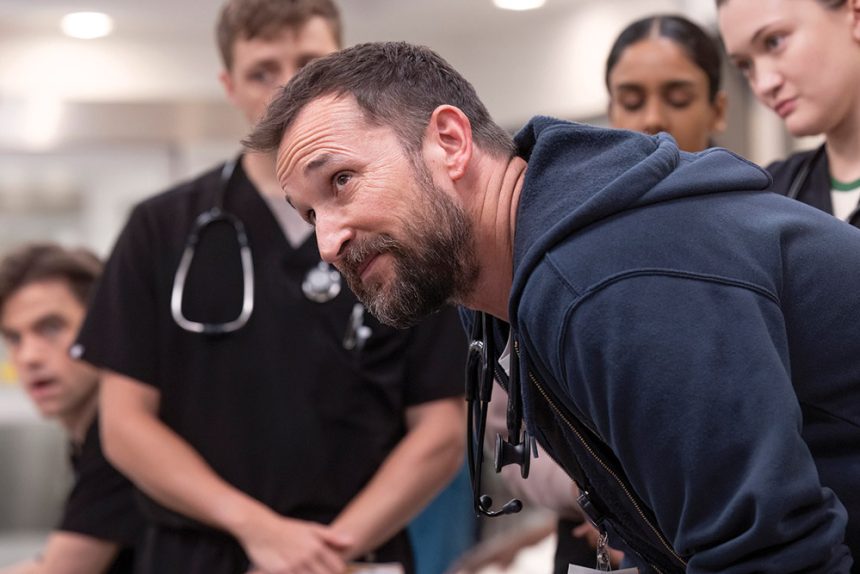R. Scott Gemmill Had a Very Different Idea for a Medical Drama Before ‘The Pitt’ – One That Involved Flashbacks to ‘ER’
The Pitt, which is nominated for 13 Emmys, has eerie parallels to the real world. Not only did its episode on measles debut the week of an outbreak in the U.S., but the HBO Max drama also grappled with a hospital’s lack of resources amid a larger culture of health care haves and have-nots, not unlike President Trump’s recent “Big Beautiful Bill” proposal that likely will lead to millions of people losing their Medicaid benefits.
Dr. Robby to the rescue? The Pitt’s creator and showrunner R. Scott Gemmill says only Noah Wyle could embrace the titular role in this timeless series.
The show had an interesting trajectory in the way it got started. I know you said you never wanted to do a medical drama again after ER.
Yes correct. I didn’t want to do one. We had done what was I thought was considered the best version, and we had done so many stories. So it was like, what would you do differently? And I would always want to go back to the ER, because it’s the most dynamic place in medicine for me. I had a way to do it as a reboot for ER, and then when that didn’t work, we just walked away. We were back to square one. And then when HBO Max said they still wanted to do a medical show, then it was sort of a clean slate, other than it was going to be me, John Wells and Noah Wyle and my friend Joe. I wanted Joe Sachs to work on the show with me, but it was like, what does a new show look like in this era and for streaming? It was great because we got to reinvent what we’d done before, and build on what we knew worked, and try things that we were totally untested by us.
How did you settle on the idea of The Pitt? I know Noah was getting an influx of messages from health care workers during COVID about how hard it was in the sector.
That was happening to Noah, but I was unaware. After COVID, I was going to develop [an idea] with another writer friend. We’d worked on shows together, including ER, and were developing and weren’t having a lot of luck. Everybody was struggling. He said, “Why wouldn’t John [Wells, executive producer on ER and The Pitt] reboot ER?” And I gave him this list of why we would never do it again. And then I said, “If there was ever a way, it would have to be very different, but same.” And I came up with a way that involved Noah. I only was going to do it if it was Noah. I knew I would have access to the original footage of ER so I could do scenes with Noah as Dr. John Carter and flash back to him as John Carter as a med student. And never in the history of television has anyone had access to footage of an actor playing the same role 30 years earlier. It never got off the ground, unfortunately. So then HBO said, “We want a medical show. What can we do?” Noah was already involved. John was already involved. And that’s where we started.
And ultimately, you decided to do a series shot in real time.
With Noah playing a doctor and also playing, because we were post COVID, a doctor that I knew from the get go was probably going to be suffering from PTSD… that, between the Robbie character and the 12 hour shift, that was sort of the how it really all started.
The show has been lauded for its realistic portrayal of hospital care and the many details that make it authentic. For example, there’s no music.
That was a big idea to sell. I did at least two episodes of ER without any music, and I knew if it was written in a specific way, you can get by without the music. That was a bit of a challenge. Not everyone was as enthusiastic about the idea, and we even tried putting music in a couple of scenes, and it just doesn’t work. … If you’ve ever been in an ER, it’s noisy, it’s horrible. And the only way to really capture that was to not have any music, so you’re not telling anyone what to feel.
What type of research goes into writing a show like this?
Research is a huge part of our show. For the mass casualty episode, we went through all the interviews that happened in Las Vegas at the mass shooting there, talked to experts who are responsible for prepping for the mass casualty situations. We even came up with some new things: The slap bands was something that we came up with for identifying patients in triage, to the point where we had people asking where they could get those.
Which scene was the most challenging for you to write?
I think Robbie’s breakdown was a little difficult. I worked with Noah a lot with that, because it’s very easy for me to write, “Robbie breaks down.” I’m very, very sympathetic about acting, and I really encourage even my writers to spend some time acting so that they understand the dynamics of the scene. Every character has some sort of intention for a scene, and once you learn that, I think it makes you a better writer. So that’s really a collaborative process.
It is eerie that some storylines are playing out the way they are in real life.
That happens more often than you realize. Our purpose is to predict a little bit. The mass casualty, that happens constantly; the measles outbreak was inevitable. The problems that Medicare and the Medicaid cuts are going to cause are inevitable, because once people can’t afford insurance, where do they go for medical care? They go to the free clinics, or they go to the ER, and they get busier and busier. We’re tapping into the experts all the time to get a leg up on, “What are the concerns?” Especially with medicine, you don’t want to be playing catch-up. Once it’s out in the open, it’s already a problem. And that’s what makes the ER so fundamentally great for storytelling is that everything shows up in the ER, and it usually shows up there before it shows up everywhere else. It’s like the canary in the coal mine. The ER has its pulse on what’s going on with society.
What can we expect for S2?
Noah’s gonna write two epidodes, and I think he’s gonna direct at least one. He’s directing episode six. He wrote episode three. And I forget what other episode he’s gonna write. I guess he’s bored. We’ll see some new faces, which is nice. We’ll see some new med students and some new doctor faces, we’ll see some of the people from before, some returns. and hopefully we’ll see some revelations about some of our other characters.
This story first appeared in an August stand-alone issue of The Hollywood Reporter magazine. To receive the magazine, click here to subscribe.







